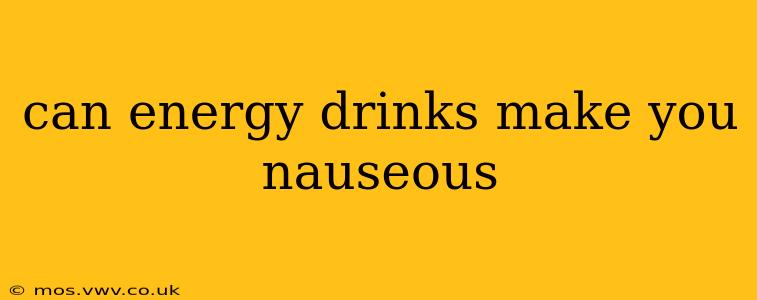Can Energy Drinks Make You Nauseous? Understanding the Link Between Energy Drinks and Nausea
Energy drinks, with their potent blend of caffeine, sugar, and other stimulants, are popular for their quick pick-me-up effect. However, for some, this energy boost comes at a cost: nausea. The relationship between energy drinks and nausea is complex and not fully understood, but several factors contribute to this unpleasant side effect. This article explores the reasons why energy drinks might cause nausea and what you can do to mitigate the risk.
What are the ingredients in energy drinks that can cause nausea?
The primary culprits behind energy drink-induced nausea are often the high concentrations of caffeine, sugar, and other stimulants. Caffeine, a potent central nervous system stimulant, can trigger nausea, especially in individuals sensitive to its effects or those who consume excessive amounts. Similarly, the high sugar content in many energy drinks can lead to a rapid spike in blood sugar, which can upset the stomach and result in nausea. Some energy drinks also contain guarana, another stimulant, which can exacerbate the effects of caffeine and increase the likelihood of nausea. Finally, certain artificial sweeteners or other additives may also contribute to gastrointestinal distress in some people.
How much caffeine is too much?
The amount of caffeine that's "too much" varies significantly from person to person. Factors influencing caffeine tolerance include body weight, metabolism, genetics, and overall health. While the FDA doesn't have a recommended daily intake for caffeine, most health organizations advise limiting caffeine intake to around 400 milligrams per day for adults. Exceeding this limit can trigger various side effects, including nausea, anxiety, insomnia, and heart palpitations. Always check the label of your energy drink to be aware of the caffeine content.
Can mixing energy drinks with alcohol cause nausea?
Mixing energy drinks with alcohol is a particularly risky combination that often leads to nausea. Alcohol is a depressant, while energy drinks are stimulants. This conflicting effect can mask the intoxicating effects of alcohol, leading to excessive consumption. The combination of alcohol's dehydrating properties and the high sugar content of energy drinks can also place significant strain on the digestive system, leading to nausea and vomiting. Avoid mixing energy drinks with alcohol to minimize the risk of nausea and other adverse health consequences.
What are the other symptoms that might occur with energy drink nausea?
Nausea is not the only symptom associated with excessive energy drink consumption. Other common symptoms include:
- Headache: Often a result of caffeine withdrawal or caffeine overload.
- Heart palpitations: An irregular or rapid heartbeat.
- Anxiety and nervousness: Caffeine's stimulatory effects on the central nervous system.
- Insomnia: Difficulty falling asleep or staying asleep.
- Diarrhea or stomach cramps: Due to the high sugar content and other additives.
- Dehydration: Because energy drinks can be diuretics.
If you experience these symptoms alongside nausea, it's crucial to limit your energy drink consumption and consult a healthcare professional.
What should I do if I get nauseous after drinking an energy drink?
If you experience nausea after consuming an energy drink, the first step is to stop drinking it. Drink plenty of water to help stay hydrated and potentially flush out the stimulants. Resting in a comfortable position and avoiding strenuous activity can also help alleviate nausea. If the nausea persists or is severe, consider contacting a healthcare provider or seeking medical attention.
Are there any alternatives to energy drinks that provide a similar energy boost without causing nausea?
Fortunately, healthier alternatives exist to provide an energy boost without the potential for nausea. These include:
- Water: Often overlooked, proper hydration is crucial for energy levels.
- Fruits and vegetables: Naturally packed with nutrients and sustained energy.
- Whole grains: Provide complex carbohydrates for long-lasting energy.
- Coffee or tea (in moderation): These offer caffeine but usually with less sugar and other additives than energy drinks.
- Regular exercise: Physical activity naturally boosts energy levels.
By understanding the potential causes and consequences of energy drink-induced nausea, you can make informed choices about your beverage consumption and prioritize your health and well-being. Remember, moderation is key, and listening to your body’s signals is crucial. If you regularly experience nausea or other adverse effects after consuming energy drinks, consult a doctor or registered dietitian for personalized advice.
